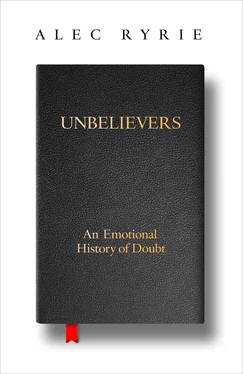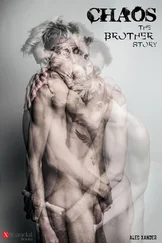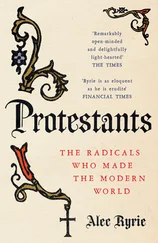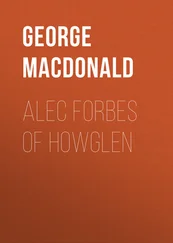These early testimonies to unbelief are often dismissed on the grounds that they lacked philosophical sophistication. If you are only interested in the history of ‘atheism’ as a system of ideas, then that is the end of the matter, and this book is not for you. What interests me is that unbelief clearly existed in practice (in some form, at some level) before it existed in theory . In which case, we have not only been looking at the wrong centuries, but profiling the wrong suspects. Intellectuals and philosophers may think they make the weather, but they are more often driven by it. People who read and write books, like you and me, have a persistent tendency to overestimate the power of ideas. Some of us may occasionally change our beliefs and our lives as the result of a chain of conscious reasoning, but not very often or very honestly. Our own age has forcibly reminded us that intellectual elites often struggle to bring their societies with them. Their default role is to tag along, explaining with perfect hindsight why things inevitably turned out as they did.
The conventional story has it that philosophers attacked religion and people therefore stopped believing. But what if people stopped believing and then found they needed arguments to justify their unbelief? ‘The heart has its reasons of which reason knows nothing,’ cautioned Blaise Pascal, the seventeenth century’s shrewdest wrestler with doubt.[9] Apart from a heroic or cold-hearted few, most of us make our lives’ great choices – beliefs, values, identities, purposes – intuitively, with our whole selves, embedded as we are in our social and historical contexts, usually unable to articulate why we have done it, often not even aware we have done it. If we have the inclination, we might then assemble rationalisations for our choices: rationalisations which may be true, but in a meagre, post hoc way.[10]
My point, simply, is that it is not only religious belief which is chosen for such instinctive, inarticulate, intuitive reasons. So is unbelief. In which case, the crucial juncture in the history of atheism is the period before the philosophers made it intellectually respectable: when the raw dough began to bubble with unexplained energy, making it urgent that intellectuals discover ways to bake, slice and package it. It is no great surprise that Enlightenment thinkers could develop atheistic philosophies. Anyone who needs a philosophy badly enough will find one, and as we will see, arguments against God and against Christianity’s core doctrines were nothing new in the mid-seventeenth century. The question is not, where did these criticisms come from, but, why did some people start to find them compelling?[11] To answer that question, we do not need an intellectual or philosophical history of atheism: we need an emotional history.
I do not mean to imply that the intellect and emotions are opposites, or that emotion is irrational. The notion that ‘head’ and ‘heart’ are opposites is a seventeenth-century canard that we are still struggling to shrug off. My gripe is with what one outstanding recent historian calls the ‘intellectualist fallacy’: ‘a tendency to privilege the clean logic of ideas above the raw fuel of human experience among the forces of historical change’.[12] The term ‘emotion’ here does not refer only to spontaneous or involuntary passions. Indeed, it includes (but is not exhausted by) the conscious intellect. We may not be able to govern our emotions fully, but we curate and manage them, and we learn them from the culture around us as well as discovering them within ourselves. It is in this sense that they can be said to have a history.[13]
Pursuing that history gives this book an hourglass shape. We begin in the broad acres of Europe’s medieval ‘age of faith’, before closing in on the so-called ‘early modern’ period of the sixteenth and seventeenth centuries, and, in particular, on the Protestant world during the Reformation. We then concentrate even more tightly on what I see as the subject’s crux: the early and mid-seventeenth century in Protestant north-western Europe. Only in the final chapter do we broaden out again, to see, after that crisis, how unbelief broke cover and emerged into the open in philosophical dress. Beneath that dress, I argue, its emotional shape has remained remarkably consistent down to the present.
The book tells two interwoven emotional stories of unbelief: stories of anger and of anxiety . Anger is the more obvious of the two: grudges nurtured against an all-embracing Christian society, against the Church in particular and often also against the God who oversaw it all. The unbelief of anxiety was a quite different experience: the unsettling, reluctant inability to keep a firm grip on doctrines that people were convinced, with their conscious minds, were true. On their own, neither of these perennial emotions threatened Christendom. If anything, they were part of the moral equilibrium and self-renewal of a thriving Christian society. What made them dangerous was the Protestant Reformation, which deliberately turned angry unbelief into a weapon of mass theological destruction, and in the process stirred up anxious unbelief like never before. The result was a strange convergence of the two emotional streams. Anger became increasingly righteous in tone: ‘atheists’ were universally assumed to be monsters of depravity, but angry unbelief turned into a moral revolt and began to find its own, distinct ethics. Meanwhile, as anxious unbelievers found that everything they tried to grapple with turned to mist and shadows, some of them despaired of finding doctrinal certainties and fastened their grip onto ethical certainties instead. So the angry and the anxious found themselves allying against traditional Christianity, opposing it not principally on intellectual grounds but on moral ones.
The emotional history of Western atheism, then, is not a story of an external assault on Christianity. It is a story of Christians and post-Christians attacking from within, and doing so from the moral high ground. When some of them reached the point of wanting to abandon or abolish God, it was not because of their intellectual rationalisations, but because their ethics and even their theology demanded it. As the sociologist Peter Berger has observed, ‘historically speaking, Christianity has been its own gravedigger’.[14] This is not chiefly because it generates intellectual critiques of itself. Rather, it generates moral critiques of itself: an operation so successful that, in parts of the Western world, the patient now seems in real danger of death. Whether the story will end that way, or whether Christianity will find that what does not kill it makes it stronger, remains to be seen. My point is simply that the history of unbelief follows a dynamic established in the sixteenth and seventeenth centuries. This dynamic is not separate from the history of belief. It is part of it.
Or so this book will argue. For now, listen to that battle-hardened pastor John Bunyan, who filled his book not with straw men and caricatures, but with acute warnings of the real temptations that awaited his readers. His ‘Atheist’, with his mocking insults, seems at first to represent angry unbelief at its crudest, but there is more to him than that. He goes on to tell the travellers that, twenty years ago, he himself heard tell of the city of God and set out on a pilgrimage to find it. Only bitter experience convinced him the search was fruitless. His tragedy is not his unbelief, but his faith. ‘Had I not, when at home, believed, I had not come thus far to seek.’ If there was a Heaven, he warns the younger travellers, he would have found it. ‘I have gone to seek it further than you.’ So now he is headed wearily home, ‘and will seek to refresh myself with the things that I then cast away, for hopes of that, which I now see, is not’.[15] His unbelief is a direct result of the anxious searching that once defined his faith. It has left him with a moral imperative: to save believers from themselves.
Читать дальше












